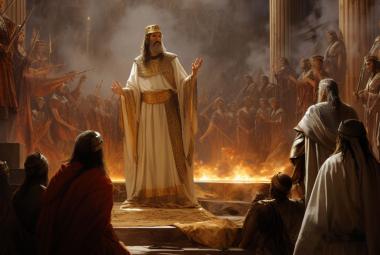We are going to focus on one Psalm that has an important nuance.1 Next to Psalm 22, it is the most quoted Psalm in the New Testament. Psalm 22 deals with the death of Christ and Psalm 69 deals with the life of Christ.
Psalm 69 is quoted in the Gospels of Matthew, Mark, Luke, John, and in Acts and Romans. There are also many references to it other than direct quotes. In Psalm 69 there is an allusion to the early years. This Psalm gives us a glimpse into “the silent years,” as they are often called, of Christ’s childhood and his young manhood of which the Gospels tell us practically nothing.
Dr. Luke records an incident in the life of our Lord when He was twelve years old and in the Temple (Luke 2:41-49). Other than that, we know very little about his childhood. This Psalm fills in some details. We will gain insight into some of His dark days in Nazareth and His dark hours on the cross in this Psalm. This Psalm is classified as an imprecatory psalm because of the imprecatory prayer in it (Psalm 69:22-28). It is from that section that most of the New Testament quotes are taken. His cry for justice is a psalm of early humiliation and rejection.
We begin in the north of Israel, in Nazareth. We hear the heart sob of a small boy, a teenager, and a young man.
Let not them that wait on thee, O Lord GOD of hosts, be ashamed for my sake: let not those that seek thee be confounded for my sake, O God of Israel. Because for thy sake I have borne reproach; shame hath covered my face. I am become a stranger unto my brethren, and an alien unto my mother’s children.
Psalm 69:6-8
There are two reasons He was bearing this:
- They hated Him because of who He was–in the same way the sinner hates the righteous person today.
- He came to take a lowly, humble place on earth–He bore reproach, and shame covered His face. Verse eight is a strange verse: “I am become a stranger unto my brethren, and an alien unto my mother’s children”–not His father’s children because Joseph was not His blood father; His siblings were half-brothers and half-sisters. They may have taunted Him and it could have been an unhappy home for Jesus.
This verse also teaches the virgin birth of Christ. A very strange phrase for the psalmist to use is “…and an alien unto my mother’s children”. Whenever one sees an apparently unnecessary detail, there is a need to look at it more closely. That is what the rabbis will call a remez, a hint of something deeper. It’s like a sign that says, “Dig here.” It is possible that Mary’s other boys, James, Judas and Joses said something like, “Mother, we heard someone say that Jesus is not really our brother. They said that nobody knows who His real father is.”2 His apparent illegitimacy may have been a common buzz about Him and His mother. Mary had other children; we know that from the Gospels.
Is not this the carpenter’s son? Is not his mother called Mary? And his brethren, James, and Joses, Judas and Simon? And are not his sisters here with us?
Mark 6:3
Four brothers are named here: James, Joses, Simon, and Judas, so there were at least four half-brothers. James and Jude later become believers, and they each wrote a book of the New Testament. We know He had four brothers and at least two sisters; it was apparently a family of seven children, maybe more. Jesus was apparently viewed as having taken up Joseph’s trade as a “carpenter.” (Hebrew: charash; Greek: tekton).3
The Psalmist continues:
For the zeal of thine house hath eaten me up; and the reproaches of them that reproached thee are fallen upon me.
Psalm 69:9
That verse is quoted in the New Testament when He cleared the Temple:
And found in the temple those that sold oxen and sheep and doves, and the changers of money sitting. And when he had made a scourge of small cords, he drove them all out of the temple, and the sheep, and the oxen; and poured out the changers’ money, and overthrew the tables. And said unto them that sold doves, take these things hence; make not my Father’s house a house of merchandise. And his disciples remembered that it was written, ‘the zeal of thine house has eaten me up.’”
John 2:14-17
The disciples link that to Psalm 69. They were well aware of Psalm 69. The Greek word for zeal signifies “to stretch out the neck,” a metaphor from the racers who strain every limb to reach forward to lay hold of the prize.
And as we continue in Psalm 69:
When I wept, and chastened my soul with fasting, that was to my reproach.
Psalm 69:10
When He would fast or weep, His brothers would ridicule Him for it. They would probably assume that He was just putting on an act. When He (Jesus) was pious they made fun of Him.
I made sackcloth also my garment; and I became a proverb to them.
Psalm 69:11
The word circulated around that He was illegitimate. In John 8: 41b-48, when He is tangling with the Pharisees, and they say, “We were not born of fornication….” They threw His apparent illegitimacy in His face. In John 8, before that chapter finishes, He tells them about their parentage in no uncertain terms in John 8:
You are of your father the devil, and the desires of your father you want to do.
John 8:44
They that sit in the gate speak against me; and I was the song of the drunkards
Psalm 69:12
Those who “sit in the gate” are the high officials of the town, the judges. The best people in Nazareth also spoke against Him. The drunks of the town are making up little unkind songs in the tavern about Him and His mother. We all know how unforgiving small towns are. His life in Nazareth could not have been nice.
Why did He endure all of this? He was reared in a town where He was called illegitimate–why? We really have no idea what He went through for those thirty years prior to His ministry. What we do know is that He was faithful in all things so that we might become a legitimate son or daughter of God. The Son of God bore insult, injury, and indignation for each of us, reaching its apex at the Crucifixion. He paid the ultimate penalty for our sins and ensured our adoption as children of God for eternity.
Our Coming King
(Inspired by Pastor S.D. Lockridge)
- He is:
- King of the Jews (racial);
- King of Israel (national);
- King of all the Ages;
- King of Heaven;
- King of Glory;
- King of Kings…and Lord of Lords.
Do you know Him? Do you really?
We often forget that He is Jewish. When we celebrate His birth, we need to realize that He was born Jewish. And, the real question this, and every, Christmas season: Do you know Him? Do you really know Him?
A prophet before Moses;
A priest after Melchizedek;
A champion like Joshua;
An offering in place of Isaac;
A king from the line of David;
A wise counselor above Solomon;
A beloved–rejected–exalted son like Joseph.
And yet far more…
The Heavens declare His glory…
And the firmament shows His handiwork…
He who is,
who was,
and who always will be;
The first and the last
He is the Alpha and Omega
The Aleph and the Tau
The A and the Z
He is the first fruits of them that slept.
He is the eg-o’i-mee’
the haw-yah’ ash-er’ hay-yah’
The “I AM that I AM”
The voice of the Burning Bush!
- the Captain of the Lord’s Host
- the conqueror of Jericho
- He is enduringly strong;
- entirely sincere;
- eternally steadfast;
- He is immortally graceful;
- Imperially powerful;
- Impartially merciful;
In Him dwells
The fullness of the Godhead bodily;
The very God of very God.
He is our Kinsman-Redeemer
And He is our Avenger of Blood;
He is our City of Refuge;
Our performing High Priest,
Our Personal Prophet,
Our Reigning King.
- He’s the loftiest idea in Literature;
- He’s the highest personality in Philosophy;
- He’s the fundamental doctrine of Theology;
- He’s the Supreme Problem in “higher criticism”!
- He’s the Miracle of the Ages;
- The superlative of everything good!
We are the beneficiaries of A Love Letter:
It was written in blood,
on a wooden cross
erected in Judea
2,000 years ago.
He was crucified on a cross of wood
Yet He made the hill on which it stood.
By Him were all things made
That were made;
Without Him was not anything made
That was made;
By Him are all things held together!
What held Him to that cross?
It wasn’t the nails!
(At any time He could have declared, “I’m out of here!”)
It was His love for you and me.
He was born of a woman so that we could be born of God;
He humbled Himself so that we could be lifted up;
He became a servant so that we could be made co-heirs;
He suffered rejection so that we could become His friends;
He denied Himself so that we could freely receive all things;
He gave Himself so that He could bless us in every way.
He is available to the tempted and the tried;
He blesses the young;
He cleanses the lepers;
He defends the feeble;
He delivers the captives;
He discharges the debtors;
He forgives the sinners;
He franchises the meek;
He guards the besieged;
He heals the sick;
He provides strength to the weak;
He regards the aged;
He rewards the diligent;
He serves the unfortunate;
He sympathizes and He saves!
His Offices are manifold; His Reign is righteous;
His Promises are sure; His Goodness is limitless;
His Light is matchless; His Grace is sufficient;
His Love never changes; His Mercy is everlasting;
His Word is enough; His Yoke is easy, and
His Burden is light!
- He’s indescribable;
- He’s incomprehensible;
- He’s irresistible;
He’s invincible!
The Heaven of heavens cannot contain Him;
Man cannot explain Him
The Pharisees couldn’t stand Him
and learned that they couldn’t stop Him;
Pilate couldn’t find any fault in Him;
the witnesses couldn’t agree against Him.
Herod couldn’t kill Him
death couldn’t handle Him
the grave couldn’t hold Him!
He has always been and always will be;
He had no predecessor and will have no successor;
You can’t impeach Him and He isn’t going to resign!
His name is above every name;
That at the name of Yeshua
Every knee shall bow,
every tongue shall confess
That Jesus Christ is Lord!
His is the kingdom, the power,
and the glory…for ever, and ever …AMEN!
Notes:
1 Author’s note: This is a nuance in Psalm 69 that I have missed in the past.
2 Author’s note: It must have been interesting when they later discover who He really is!
3 Hebrew: charash; Greek: texton: This word, which is a general word for graver or craftsman, is translated “carpenter” in 2 Kings 22:6; 2 Chronicles 24:12; Ezra 3:7; Isaiah 41:7. The same word is rendered “craftsman” in the American Standard Revision Version of Jeremiah 24:2 and 29:2 and “smith” in the American Standard Revised Version of Zechariah 1:20. In 2 Samuel 5:11; 2 Kings 12:11; 1 Chronicles 14:1; and Isaiah 44:13, Hebrew “charash” occurs with Hebrew ets (wood) and is more exactly translated “carpenter” or “worker in wood.” The Greek Tekton, the corresponding Greek word for Artificer, is translated “carpenter” in Matthew 13:55 and Mark 6:3.






